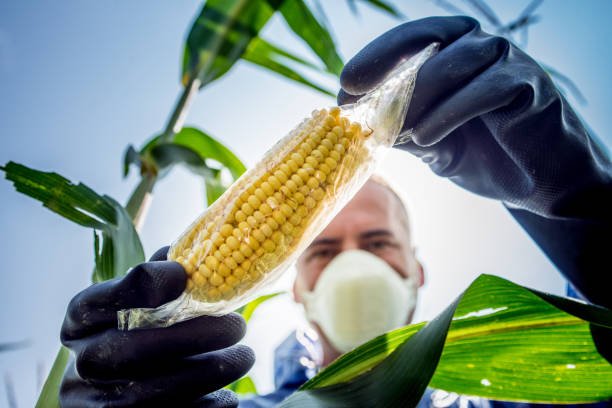
An illustrative photo of a genetically modified maize (Photo: Istock Image)
Public debate continues to intensify over the spread of genetically modified crops in Nigeria, particularly cowpea, popularly known as beans.
The discussion was recently triggered by a video shared on X by medical doctor and influencer,
Dr. Chinonso Egemba, popularly known as Aproko Doctor. In the clip, he promoted genetically modified organisms such as Bt cowpea, citing reduced pesticide use and higher productivity.
His position, however, drew sharp criticism from scientists and activists, including molecular geneticist, Dr. Ify Rhodes-Vivour, who questioned the safety and transparency of the process.
Rhodes-Vivour noted that “the cowpea GM trait has been banned in Burkina Faso. So why is Nigeria now promoting it heavily here? Our people are eating what other African countries rejected.”
She warned that GM traits could expose Nigerians to harmful chemicals such as glyphosate.
Online users also shared similar concerns, with one commenting, “We now have farmers spraying beans with herbicides because the seeds are engineered to tolerate them. It ends up in our food. Nobody is talking.”
Architect and politician, Gbadebo Rhodes-Vivour, also faulted the policy, stating that the use of patented GM seeds undermines farmers’ autonomy.
“Once you allow patented GM seeds into your farming system, you lose control. Farmers are forced to buy seeds every season, can’t reuse seeds, and get locked into cycles of debt,” he said.
He further accused biosafety agencies of lacking transparency in granting approvals.
Nigeria’s National Biosafety Management Agency has in recent years approved several GM crops, including Bt cowpea, GM maize, and GM cotton. The agency insists these innovations are meant to increase yields, cut pesticide use, and improve food security.
Reactions to Egemba’s video also included media scholar Akin Olaniyan, who observed that while the doctor’s message was informative, it lacked balance.
“While it is important to make scientific information digestible to a broad audience, it is equally vital not to water down complexities in the name of convenience,” he wrote.
Supporters of Bt cowpea, such as the Alliance for Science at Cornell University, pointed to more than 10 years of trials showing 20–80 per cent reductions in pesticide use and higher yields.
Reports shared by farmers online confirmed fewer pest attacks and reduced chemical use
application.
However, European biosafety group Testbiotech, in a 2022 review, faulted Nigeria’s risk assessments as inadequate, citing concerns about allergenicity, potential gene flow to wild species, and lack of long-term studies.
Civil society organisations, including the Health of Mother Earth Foundation, have called for the withdrawal of GM crops pending independent tests. They argue that widespread adoption could threaten biodiversity, food sovereignty, and smallholder farmers.
The Director-General of the National Agency for Food and Drug Administration and Control, Prof. Mojisola Adeyeye, countered health concerns, saying GMO foods are not harmful if safety protocols are followed.
“GMOs are genetically modified foods when it comes to food, and they are not bad for us. They’re not. They are not bad for us, depending on what type of foods they are and whether these safety considerations have been taken,” she said during a television
interview.
Adeyeye explained that NAFDAC works with the National Biosafety Management Agency to ensure quality and safety.
“We have an MoU with them. They are mandated to ensure that the foods that have GMO are of quality, they are safe,” she said.
The House of Representatives also held a public hearing on the matter in Abuja, where the Minister of Agriculture and Food Security, Abubakar Kyari, pledged government commitment to food safety.
“The government will not deliberately bring what is poisonous to the people. This forum is meant for sharing ideas from GMO experts to find a level playing field for food security,” he told participants.
At the same hearing, anti-GMO campaigners under the GMO-Free Nigeria Alliance, a coalition of 200 groups, urged lawmakers to impose a complete ban. Their consultant, Inibehe Effiong, said, “We would like to see in the interim… a national moratorium declared… GMO distribution and circulation in Nigeria should be halted.”
Stakeholders also questioned the performance of GM cotton introduced in 2020, with the National Cotton Association of Nigeria reporting no significant increase in yield compared to local seeds.
Civil society groups stressed that Nigeria’s food sovereignty and biodiversity are at stake.
Mr. Qrisstuberg Amua of the Centre for Food Safety and Agriculture Research alleged that GMOs were tied to insecurity, saying, “GMOs are biological weapons and agents of mass destruction. They are pushing insecurity on our nation, sponsoring it clandestinely.”
While supporters highlight potential benefits for farmers, critics insist on stricter oversight, transparency, and independent studies before widespread adoption.
Support links: